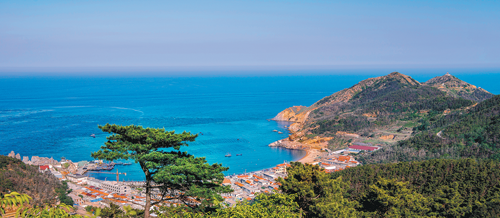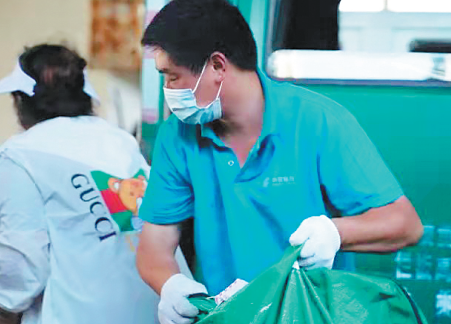Island postman connects a community
China Daily2021-10-11 16:36
By MO JINGXI
On remote Beihuangcheng, most residents are elderly. They depend on the easygoing parcel carrier to supply their needs, solve minor problems or just talk.

Ge Xi, 34, is a young man by the standards of Beihuangcheng Island in Shandong province. He is one of a handful of people his age who remain. He has kept company with the island and its elderly population for the past four years as its sole postman.

With a surface area of only 2.79 square kilometers, Beihuangcheng is roughly one-10th the size of the Republic of Nauru, the world's third-smallest country. Fishing and sea farming are the major ways for residents to earn a living.
While young islanders often move elsewhere for higher incomes and better lives, some people in middle age have stayed on to care for elders in their 80s and 90s.
Four years ago, the head of the island's post office found Ge and asked him to fill a vacancy in the outsourced position after the last postman, a 20-something man, left the island to look for a marriage partner.
Ge had been running a barbecue restaurant with his wife and worked in his spare time as a truck driver to transport fishing nets, shrimp and scallops. An indigenous islander, he himself had left Beihuangcheng for a time to complete junior high school when he was a teenager. But he returned after suffering a back injury at work in 2007.
"He told me I could take it as a part-time job, so I accepted," Ge said of the postal chief's offer.
But it turned out that the postman's work was not as easy and light as expected.
A ship, which comes twice a day, is the island's only transport connection with the outside world. And that's only when it's not suspended because of bad weather at sea.
Every morning, Ge drives a dark green postal truck loaded with parcels to the wharf. He waits for a ferry to take the parcels to the nearest land-Penglai, Shandong province. It's a voyage of some five hours.
The postman appears again in the afternoon to fetch newly arrived parcels that have traveled four to five days on a trip over both land and sea to Beihuangcheng. The rest of the day, he stays busy either sorting parcels or delivering them door to door.
At first, it took considerable time for Ge to find the recipients because streets on the island are not named. Nor is every household. Sometimes, he even has to help an elderly resident find out who sent the mail. In that case, he makes a phone call. As a frequent visitor to people's homes, Ge is trusted. The elderly rely on him to help whenever they encounter problems in daily life. They will ask for him for help with various trifles-inserting a SIM card into a smart phone, for example-or just engage in small talk.
"Maybe it's because I'm easygoing," Ge said.
Yearning for home
Zou Huilan, 66, said she feels a special affinity for the postman, as well as for all the younger people on the island. She returned to Beihuangcheng in 2017 to look after her mother-in-law, who is now 95. By comparison, Ge qualifies as young. It makes Zou happy.
"The young people are just the age of my son, and people about my age all know me, so I feel warm and comfortable living here," Zou said.
Zou left the island and went to Weihai, Shandong province, nearly three decades ago.
"Life on the island seemed so boring when I was young. I even hated coming back after a work trip off the island at that time," she said.
In 1999, she traveled alone to Paris, France, and worked as a nanny for seven years. In 2008, after a plan she had made with her husband to open a restaurant in Quito, Ecuador, fizzled because of the financial crisis, the couple found work cooking meals at a Chinese company based there. Zou's son and daughter-in-law are now running a grocery store in Quito.
But Zou's yearning for Beihuangcheng, her birthplace, deepened as she grew older abroad. She was homesick. So, in 2017, she insisted on going back to the small island where she had grown up, even though her family believed that the island, with a limited rural medical clinic, was not a good choice.
Zou was diagnosed with diabetes in 2013, and she requires regular injections of insulin. The drugs that Zou and her mother-in-law need must be brought to the island by sea, and service can be suspended for days or weeks at a time during the winter. But she gets by.
"It's not a problem. I always stock up in case of a suspension," she said.
Zou enjoys her quiet, pollution-free life on the island. "I feel great satisfaction when I'm lying on the bed and gazing at the blue sky outside," she said.
When the weather is good, she will push a wheelchair with her mother-in-law to the seaside for a leisurely walk after supper.
She has settled down in her newly furnished house, waiting to be reunited with her husband, who is stuck in Ecuador because of prohibitively expensive international flights in the COVID-19 era.
"Thanks to the development of online shopping, even on Beihuangcheng you can buy everything you need," Zou said.
This year, she bought seafood-prawns and abalone-from outside the island for her mother-in-law's birthday. "Abalones on the island are wild and are too expensive," she said, laughing.
Letters for an old soldier
While most parcels Ge deals with every day are daily necessities purchased from outside, every month or so one or two written letters will pop up.
Song Qichang, and 89-year-old veteran, used to exchange letters with his comrades-in-arms far away in East China's Zhejiang province. His hearing has gone downhill, so it's hard to understand their voices on the phone. From the letters Ge brings, Song learned that some of his comrades had died. Others had moved into nursing homes.
Ge comes to fetch a letter at Song's residence if he happens to pass by. Sometimes when Song hadn't finished because he forgot how to write certain characters, the postman shows him how. Then Song can copy it.
But the old man stopped writing letters after last winter. Three comrades that he had frequently written to had passed away. The number of parcels coming on the island each day are also decreasing, from more than 70 a day in recent years to fewer than 40 now.
Schools and kindergartens on Beihuangcheng Island have all closed because they are no longer needed for children. Last year, Ge's wife left the island with their five-year-old daughter for kindergarten on Changdao Island, which is closer to the mainland and has more education and health facilities.
Ge, who becomes seasick easily, only leaves the island to accompany them every month or two. Now the postman has started to think about leaving the island again for good, but he has no idea what kind of work to do in the future, or when to leave.
"I'll just see how things go," he said.
Randy Wright contributed to this story.
